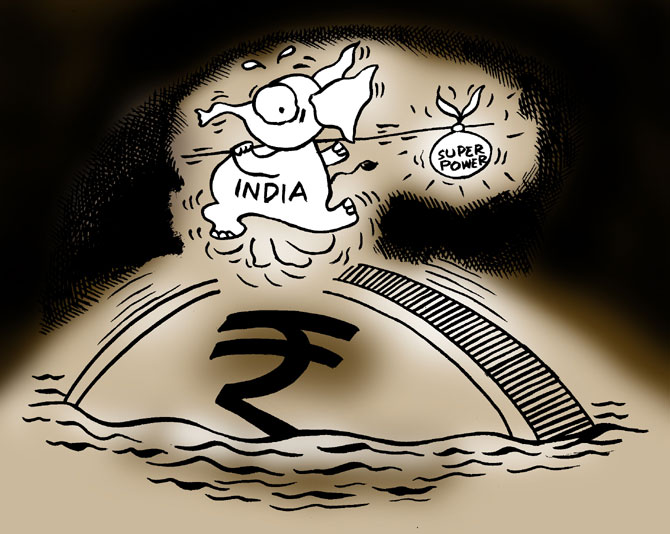
Foreign portfolio investors (FPIs) have been increasing their investments in Indian equities but the restrictions on foreign ownership could affect their ability to raise bets on blue-chip names which might benefit from the uptick in the economy.
Foreign investors have already used up close to three-fourth of the investible limits in cyclical sectors such as consumer discretionary, financials and industrials, according to a strategy report from the institutional equities division of Kotak Securities.
“We believe further sector rotation in the blue-chip segment may be hindered due to foreign ownership constraints."
"Based on average annual foreign institutional investor (FII) inflows, top-tier industrial stocks may be inaccessible within a year. Although the CNX Nifty Junior constituents may provide some incremental access to the industrials sector, foreign investors have already used about 70 per cent of the FII limit,” said the report, authored by Saifullah Rais.
Please click NEXT for more...

This comes even as foreign investors continue to buy into the India story. Bank of India Merrill Lynch, in its India Equity Strategy report dated Tuesday, noted global emerging market (GEM) funds had been increasing the weightage given to India in their portfolios in recent times.
“GEM funds are OW (Overweight) India and have been raising their OW in India constantly (see Chart 1).
Investors believe the Indian growth story clearly stands out amongst the EM (emerging market) universe. However, future FII flows might be driven by global funds not as heavily positioned in India,” said the report, authored by research analysts Jyotivardhan Jaipuria and Anand Kumar.

Please click NEXT for more...

A Credit Suisse Securities’ India Market Strategy report dated Monday noted India’s premium to other EMs was near a five-year high and suggested more upside was likely.
“We find the comparison with other EMs as a basket inappropriate."
A more appropriate comparison in our view is India's premium versus MSCI World: it is up a mere 13 per cent from the bottom, and far below the peak of 46 per cent in July '10,” said the report, authored by research analysts Neelkanth Mishra and Ravi Shankar.
FPIs own 23 per cent of the 50 Nifty companies, according to the Kotak report.
This is equal to nearly half (45 per cent) of the publicly available shares. However, companies have limits on how much of their shares can be owned by foreign investors. Taking this into account, foreign ownership is at 60 per cent of permissible limits, it said.
In many individual sectors, foreign ownership is inching closer to their ceilings.
“Cyclical sectors such as consumer discretionary (80 per cent), financials (77 per cent) and industrials (74 per cent) have used up most of their available FII limit."
"This implies foreign investors can incrementally buy only $2.2 billion in the industrials sector within the CNX Nifty 50,” said the report, authored by Saifullah Rais.
Please click NEXT for more...

Foreign investors have been net buyers by Rs 71,109 crore (Rs 711.09 billion) so far in 2014, even as the benchmark indices are up around 22 per cent.
They are now looking at the broader market as a means of increasing exposure in India.
They have increased their shareholding in 172 of the 350 mid-cap and small-cap companies which have declared their shareholding pattern so far, cutting stake in 114.
Among blue-chips, they have increased their bets in nearly twice as many stocks as they cut their holding in during the June quarter.
They have raised their holdings in 33 of the 50 stocks that make up the National Stock Exchange’s Nifty index.
Additional capital raising by companies could provide some room for further investments, according to Rikesh Parikh, vice-president at Motilal Oswal Securities.
“The Initial Public Offer and Qualified Institutional Placement pipeline, coupled with the government divestment programme, could help absorb additional foreign inflows,” he said.
The government has a disinvestment pipeline of about Rs 60,000 crore (Rs 600 billion) for this financial year.
Qualified institutional placements raised Rs 16,293 crore (Rs 162.93 billion) in the June quarter alone, according to statistics from Prime Database.